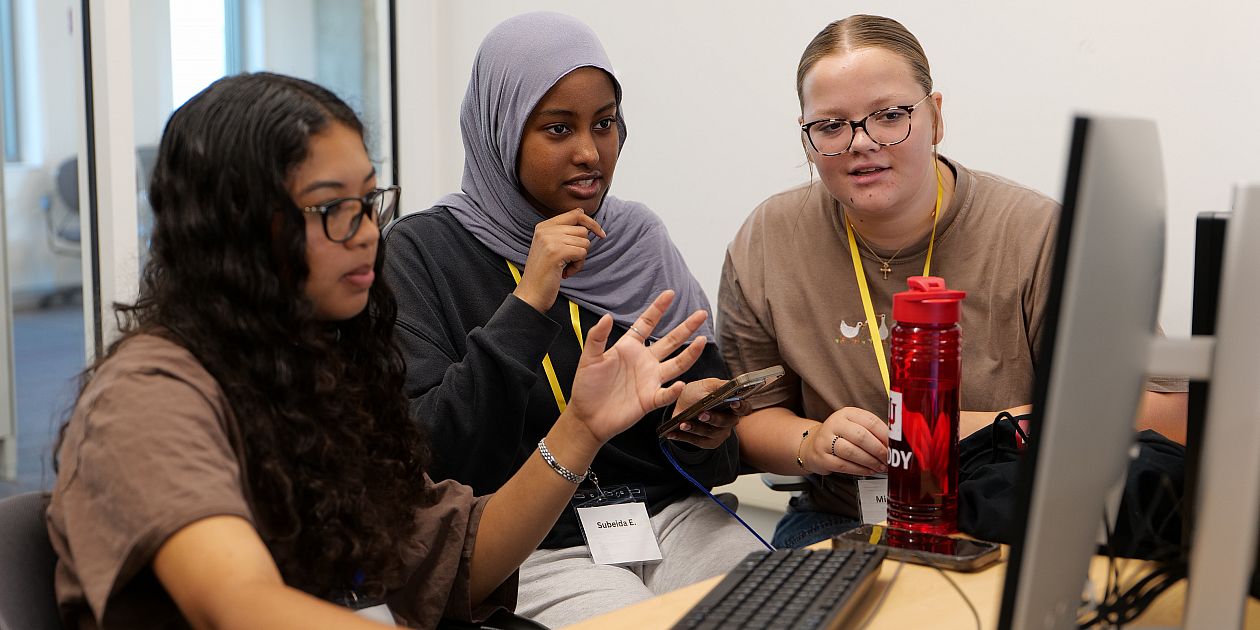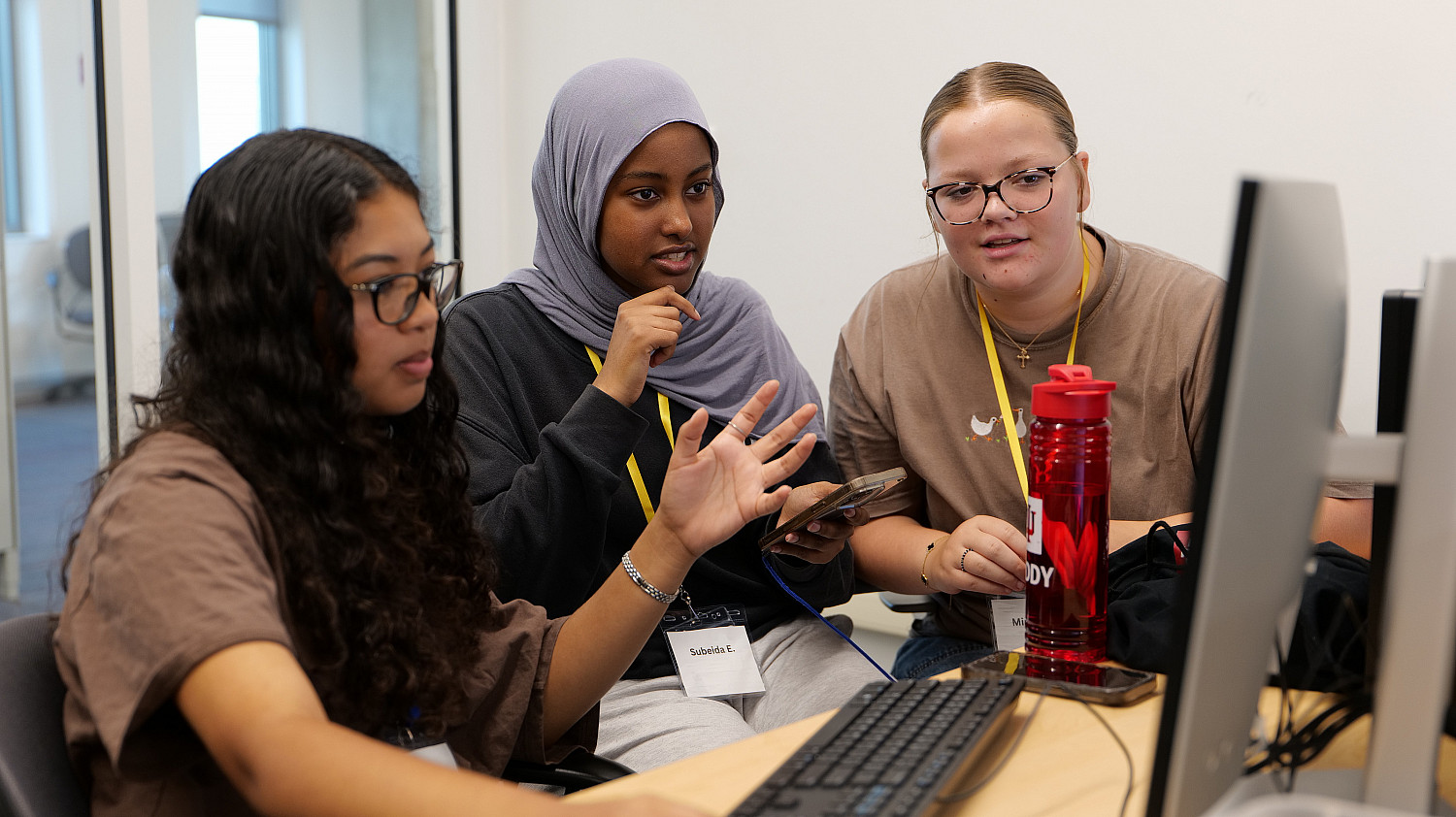 Campers focus on project during Luddy’s Precollege Summer Camp.
Campers focus on project during Luddy’s Precollege Summer Camp.
Photo by Chris Kowalczyk, Luddy Communications
Robots collided in a Luddy School of Informatics, Computing, and Engineering’s Precollege Summer Camp challenge that showcased the campers’ robotic ingenuity, Science Technology Engineer and Mathematics (STEM) potential and ability to learn fast and well.
Last Friday at Luddy Hall, that meant Team Rhino Slammer, a four-drive-motor robot designed and constructed by high school students in just two days, defeating Team Flippy’s two-drive-motor robot during a camp-closing sumo-like competition by twice knocking it off a table in Dorsey Hall.
The winning strategy came down to this: “Ram with everything we’ve got.”
With Europe’s “Final Countdown” playing in the background, robots demonstrated the ability to move forward, backward, and do 360-degree spins.
“This year, we met some of the most ambitious and creative students we’ve ever had,” said Leigh Levinson, camp coordinator and Luddy Informatics and Cognitive Science Ph.D. student. “They did 20-plus projects that spanned from designing and animating in virtual reality to four-motor robotic prototypes and designing home security systems.”
The weeklong camp drew 80 high school students from around the country, including California, Texas, New York and even Puerto Rico. The technology-focused, hands-on camp focused on STEM and society while addressing topics such as cybersecurity, engineering, virtual reality and programming.
Joshua Streiff, director of pre-college camps and cybersecurity staff director for the Security & Privacy in Informatics, Computing and Engineering (SPIECE) Center, said students could experience topics they’d never explored before, and focus on a couple that most interested them.
“They can explore them in greater depth,” he said. “It’s only possible because Luddy has such a vast array of faculty, staff and students.”
Lillian Jin was all in. Camp opportunities drew this senior-to-be from a Fort Wayne, Indiana, area high school for the second time. They were why she pushed possibilities of what she might one day do in STEM, and why she plans to enroll at Indiana University and the Luddy School for the 2026-27 academic year.
“I like a lot of STEM ideas,” Jin said. “I want to be a part of it. I want to be a computer software engineer. This camp is perfect for me. I had such a great time last year. I wanted to do it again.
“The environment is amazing. The counselors are amazing. Overall, it’s a great camp.”
Luddy has hosted this week-long camp since 2005, and the impact was obvious in its instructing and recruiting. Campers attended classes and engaged in academic competitions under the direction of a group of faculty, staff, undergraduate and graduate students. They explored topics that encompassed the Luddy School’s many academic opportunities. They also participating in activities such as swimming, an escape room, crafts, sports (including tennis and pickleball), tie dye and board games. They stayed at Teter Quadrangle.
An emphasis on recruiting young women and encouraging them to get involved in STEM programming produced female campers, more than ever before, Streiff said.
“We give high schoolers a chance to sample a variety of classes in science and technology that can pique their interest in informatics, computer science, data science, robotics, cybersecurity and engineering,” Levinson said.
“Campers are encouraged to participate in a design challenge where they consider how technology can be used to address socio-technical problems and opportunities. The week blends innovation and exploration while catering to the students’ interests.”
*****
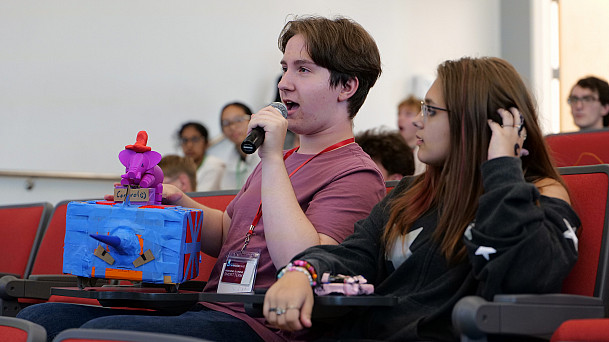
Precollege Summer Camp students explain their robot’s winning design and strategy.
Credit: Photo by Chris Kowalczyk, Luddy Communications
The robotics competition topped Jin’s must-do list.
“Robotics was one of the main topics I enjoyed and the design challenges that came with it. Our team focused on a product. I enjoyed making it and the process of it.”
If the process got too complex, camp counselors offered guidance.
“If I had a problem and didn’t know how to solve it,” Jin said, “all the counselors helped. It meant so much to me that they care about our future.”
Sarah Alf, a first-time camp participant and senior-to-be from the Chicago area, praised the camp’s creative freedom and multiple opportunities.
“All the counselors were super encouraging of our ideas and gave us the resources to take our ideas to the next level,” she said. “The fact the camp wasn’t just focused on learning was cool. We got opportunities to do a lot of things, meeting other kids with similar interests and make connections just like you would in college.”
Highlights included web development classes.
“I want to go into engineering with business, and the product design challenge helped bring out my business style, engineering style presentations and speaking,” Alf said
The Luddy School’s diverse opportunities also made a big impression on Alf, who plans to choose a college this fall.
“I’m really into engineering. I wanted to do a college experience, and this camp gave me that opportunity to feel what it’s like to be at a college and take real classes.”
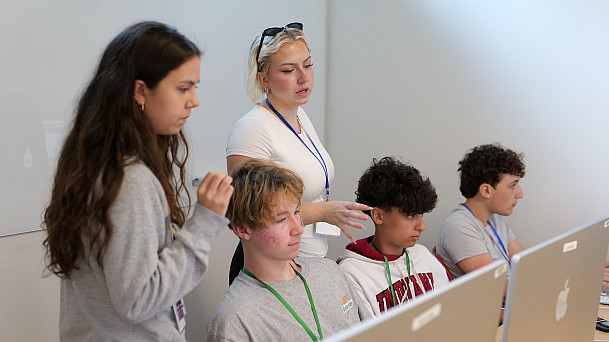
Precollege Camp counselor instructs students during a mobile app design class.
Credit: Photo by Chris Kowalczyk, Luddy Communications
Streiff credited the counselors for making a big impact. That included Sam Popek, a Luddy Informatics graduate who will pursue a master’s degree in design innovation at the University of Wisconsin starting this fall. She taught a popular mobile app design class.
“A lot of campers get an eye opener for what fields they’re interested in,” she said. “Tech has a large variety of fields to go into. This camp gives them a taste of each unique field. They like trying new experiences and learning new things. It shows them what they can do in college.”
This was Popek’s third year as a camp counselor. She started following a recommendation of fellow Luddy student Kareena Katsman, a four-year camp counselor.
“I kept coming back because I enjoyed working with the campers, interacting with them and having fun experiences with them,” she said. “I wish I had gone to a tech camp when I was in middle school or high school just to get to experience all the opportunities.”
*****
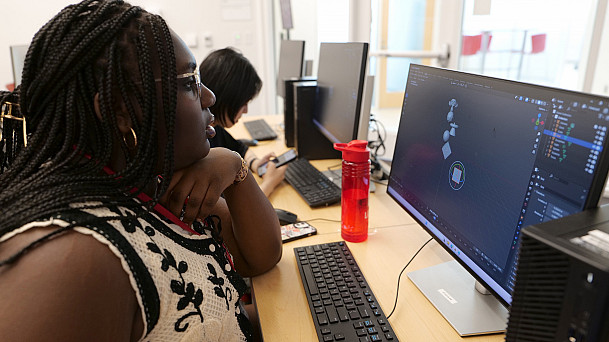
Precollege Camp student explores Luddy School opportunities
Credit: Photo by Chris Kowalczyk, Luddy Communications
Jon Stewart, an upcoming senior at a high school near Indianapolis, attended the camp for the first time.
“I came for (academic) exploration. I’ve been doing computer science for a while, and I wanted to expand into more fields. This was the perfect camp that brings a healthy mix of computer science, robotics, engineering, data science, and a slew of things.”
Cyber security was a highlight. Stewart said he might pursue a career in it because of the camp and Steiff’s impact.
“Cyber security is more important now than ever. Joining in the workforce would be beneficial to me and everyone else. This camp opened new paths for me.”
Alaya Lewis, an upcoming sophomore at an Indianapolis high school, arrived with a strong interest in STEM.
“The counselors made it fun and engaging,” she said. “They were all bright and brought a lot of energy. The other campers saw it, too.”
Lewis said she wants to study animals as a career. Luddy has the world’s first degree programs in Animal-Computer Interaction (ACI) and Animal Informatics.
“The camp was a good and positive environment,” she said. “It had so much to offer and teach. You got the chance to have fun and try new things.”
Lewis added that she would tell future campers to “take as many classes as you can. Not a lot of kids get this opportunity. We need to take advantage as best we can.”
Joseph Waltman, an upcoming senior from Indianapolis said the camp’s cybersecurity classes made a big impact given he plans to pursue a career in the field.
*****
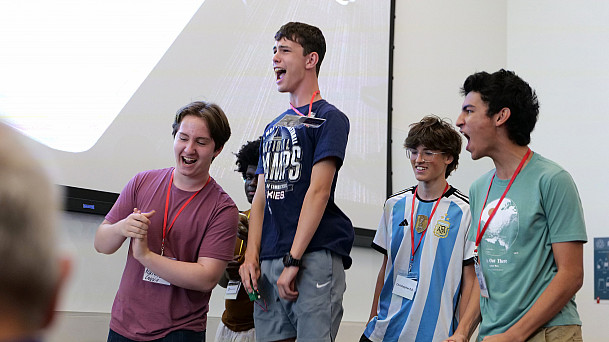
Precollege Camp students celebrate winning robot competition
Credit: Photo by Chris Kowalczyk, Luddy Communications
Camp advantages went well beyond academics – including the fact students walked almost five miles a day while expending intellectual and physical energy. Streiff said the social component and providing a place where students can fit in were also important.
Levinson said she enjoyed fostering “STEM geekdoms” while also building campers’ confidence in their ideas, encouraging them to work on teams, and watching them learn with Luddy students as their counselors.
“It was exciting to see what the next generation of Luddy students is already doing in very short spans of time.”
Jin praised the camp’s longevity and opportunities.
“If you have the chance to take this camp, please do. It has taught me so many things.”
Added Stewart: “The people here are great. The staff is very friendly. They take the time to get to know you. It was a fun, healthy experience.”
*****
Luddy also hosted a Sea-Cadet Camp in conjunction with the Naval Surface Warfare Center Crane Division. Streiff described it as the Navy’s version of the ROTC. Nearly 20 students from around the country will participate. Streiff, Robert Templeman, executive director of IU’s Cybersecurity Innovation, and Isak Asare, co-director for the Cybersecurity and Global Policy Program, are among the instructors.
Streiff previously directed a cybersecurity camp for high school girls earlier this summer. The weeklong virtual camp was designed for young women interested in getting experience with popular cybersecurity tools and technology, with a focus on artificial intelligence.

